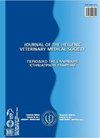The effects of ad - libitum consumption of chitosan oligosaccharide with drinking water on laying quails
IF 0.4
4区 农林科学
Q4 VETERINARY SCIENCES
引用次数: 0
Abstract
The aim of this study was to determine the effects of chitosan oligosaccharide on feed conversion ratio, some egg quality parameters, and some blood parameters in Japanise quails. Chitosan oligosaccharide (ChitO) was added to the drinking water of quails. A total of 192 (7 – 8 weeks old) Japanese quails (Coturnix coturnix Japonica) were divided into one control and 3 treatment groups, each consisting of 48 quails. Each group was divided into 6 replicates. While no additive was added to the control group, ChitO was added to the drinking water of the first, second, and third groups at the levels of 0.015, 0.030 and 0.045 g / L, respectively. They were given water and feed ad libitum. At the end of the study, no significant differences were observed between the control and treatment groups, except in their feed consumption and egg shell weight. In the first treatment group (given 0.015 g / L ChitO), it was observed that feed consumption decreased significantly compared to the control group; however, the difference between the other treatment groups was insignificant. The egg shell weight of the second treatment group (0.030 g / L ChitO) was found to be significantly higher (p < 0.05) than that of the control group. In general, consumption of chitosan oligosaccharide with drinking water tended to decrease feed consumption, without adversely affecting feed efficiency, and tended to increase eggshell weight.随意饮用低聚壳聚糖对产蛋鹌鹑的影响
本试验旨在研究壳寡糖对日本鹌鹑饲料系数、蛋品质及血液指标的影响。将低聚壳聚糖(ChitO)添加到鹌鹑的饮用水中。选取7 ~ 8周龄日本鹌鹑192只,分为1个对照组和3个治疗组,每组48只。每组分为6个重复。在对照组不添加添加剂的情况下,在第一组、第二组和第三组的饮用水中分别添加0.015、0.030和0.045 g / L的ChitO。他们得到了免费的水和饲料。试验结束时,除采食量和蛋壳重外,对照组与处理组之间无显著差异。第一处理组(给予0.015 g / L ChitO),与对照组相比,采食量显著降低;然而,其他治疗组之间的差异不显著。第二处理组(0.030 g / L ChitO)的蛋壳重显著高于对照组(p <0.05),显著高于对照组。总的来说,饮用低聚壳聚糖有降低饲料耗量的趋势,但对饲料效率没有不利影响,反而有增加蛋壳重的趋势。
本文章由计算机程序翻译,如有差异,请以英文原文为准。
求助全文
约1分钟内获得全文
求助全文
来源期刊

Journal of the Hellenic Veterinary Medical Society
VETERINARY SCIENCES-
CiteScore
0.60
自引率
0.00%
发文量
83
审稿时长
>12 weeks
期刊介绍:
The Journal of the Hellenic Veterinary Medical Society (J Hellenic Vet Med Soc) is a quarterly peer-reviewed journal that publishes articles in all aspects of veterinary science and related disciplines. It is published by the Hellenic Veterinary Medical Society and is indexed in the Web of Science and in Scopus.
There are no publication fees in the journal. Authors considering submitting manuscripts for evaluation and publication are requested to read carefully the instructions for authors and fully comply with them.
Non-complying manuscripts may be returned to the corresponding author for formatting.
 求助内容:
求助内容: 应助结果提醒方式:
应助结果提醒方式:


